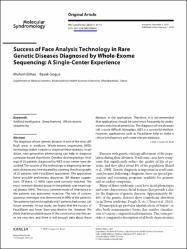| dc.contributor.author | Elmas, Muhsin | |
| dc.contributor.author | Göğüş, Başak | |
| dc.date.accessioned | 2021-05-05T22:14:12Z | |
| dc.date.available | 2021-05-05T22:14:12Z | |
| dc.date.issued | 2020 | |
| dc.identifier.issn | 1661-8769 | |
| dc.identifier.issn | 1661-8777 | |
| dc.identifier.uri | https://doi.org/10.1159/000505800 | |
| dc.identifier.uri | https://hdl.handle.net/20.500.12933/363 | |
| dc.description | WOS:000526860000002 | en_US |
| dc.description | PubMed: 32256296 | en_US |
| dc.description.abstract | The diagnosis of rare genetic diseases is one of the most difficult areas in medicine. Whole-exome sequencing (WES) technology makes it easier to diagnose these diseases. In addition, next-generation phenotyping can help to diagnose computer-based algorithms. Detailed dysmorphologic findings of 25 patients diagnosed by WES in our center were described. The success of this technology in diagnosing rare genetic diseases was investigated by scanning the photographs of 25 patients with Face2Gene application. The application listed possible preliminary diagnoses (30 disease suggestion). Of these, 12 (48%) cases were correctly matched. The most common disease group in the patients was neurological disease (96%). The most common mode of inheritance in the patients was autosomal recessive. The rate of consanguineous marriages was determined in 80% of the patients. Ten patients had microcephaly and 7 patients had corpus callosum anomaly. In our study, we found that the success of Face2Gene was lower than described in the literature. We think that the probable cause of this condition is that the cases are very rare, and there is not enough data about these diseases in the application. Therefore, it is recommended that applications should be used more frequently by pediatricians and clinical geneticists. The diagnosis of rare diseases still is quite difficult. Nowadays, WES is a successful method. However, applications such as Face2Gene help to make a clinical prediagnosis and create a larger database. | en_US |
| dc.language.iso | eng | en_US |
| dc.publisher | Karger | en_US |
| dc.rights | info:eu-repo/semantics/openAccess | en_US |
| dc.subject | Artificial intelligence | en_US |
| dc.subject | Deep learning | en_US |
| dc.subject | Whole-exome sequencing | en_US |
| dc.title | Success of Face Analysis Technology in Rare Genetic Diseases Diagnosed by Whole-Exome Sequencing: A Single-Center Experience | en_US |
| dc.type | article | en_US |
| dc.department | AFSÜ, Tıp Fakültesi, Dahili Tıp Bilimleri Bölümü, Tıbbi Genetik Ana Bilim Dalı | en_US |
| dc.contributor.institutionauthor | Elmas, Muhsin | |
| dc.contributor.institutionauthor | Göğüş, Başak | |
| dc.identifier.doi | 10.1159/000505800 | |
| dc.identifier.volume | 11 | en_US |
| dc.identifier.issue | 1 | en_US |
| dc.identifier.startpage | 4 | en_US |
| dc.identifier.endpage | 14 | en_US |
| dc.relation.journal | Molecular Syndromology | en_US |
| dc.relation.publicationcategory | Makale - Uluslararası Hakemli Dergi - Kurum Öğretim Elemanı | en_US |
















